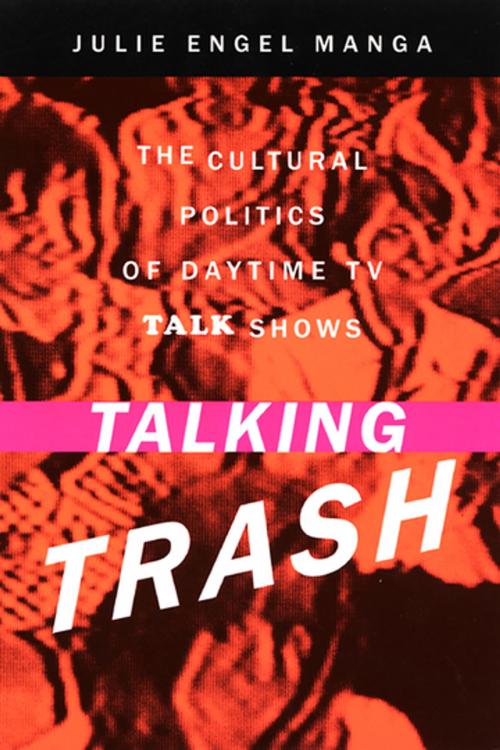Talking Trash
The Cultural Politics of Daytime TV Talk Shows
Nonfiction, Social & Cultural Studies, Social Science, Cultural Studies, Popular Culture| Author: | Julie Manga | ISBN: | 9780814761298 |
| Publisher: | NYU Press | Publication: | January 1, 2003 |
| Imprint: | NYU Press | Language: | English |
| Author: | Julie Manga |
| ISBN: | 9780814761298 |
| Publisher: | NYU Press |
| Publication: | January 1, 2003 |
| Imprint: | NYU Press |
| Language: | English |
When The Phil Donahue Show topped the ratings in 1979, it ushered in a new era in daytime television. Mixing controversial social issues, light topics, and audience participation, it created a new genre, one that is still flourishing, despite being harshly criticized, over two decades later. Now, the daytime TV landscape is littered with talk shows. But why do people watch these shows? How do they make sense of them? And how do these shows affect their viewers' sense of what constitutes appropriate public debate?
In Talking Trash, Julie Engel Manga offers a fascinating exploration of these questions and reveals the wide range of reasons viewers are drawn to “trash talk.” Focusing on such shows as Oprah!, Jerry Springer, Ricki Lake, Jenny Jones, and Maury Povitch, and drawing upon interviews with women who watch these shows, Talking Trash is the first examination of the talk show phenomenon from the viewers’ perspective. In taking this approach, Manga is able to understand what talk shows mean to the women who watch them. And by refusing to judge either the shows or their viewers as good or bad, she is able to grasp how viewers relate to these shows-as escape, entertainment, uninhibited public discourse, or an accurate reflection of their own hardships and heartaches. Manga concludes that while the form of “trash-talk” shows may be relatively new, the socio-cultural experience they embody has been with us for a long time.
Absorbing, entertaining, and keenly perceptive, Talking Trash illuminates the complex viewer response to “trash talk” and examines the cultural politics surrounding this wildly controversial popular phenomenon.
When The Phil Donahue Show topped the ratings in 1979, it ushered in a new era in daytime television. Mixing controversial social issues, light topics, and audience participation, it created a new genre, one that is still flourishing, despite being harshly criticized, over two decades later. Now, the daytime TV landscape is littered with talk shows. But why do people watch these shows? How do they make sense of them? And how do these shows affect their viewers' sense of what constitutes appropriate public debate?
In Talking Trash, Julie Engel Manga offers a fascinating exploration of these questions and reveals the wide range of reasons viewers are drawn to “trash talk.” Focusing on such shows as Oprah!, Jerry Springer, Ricki Lake, Jenny Jones, and Maury Povitch, and drawing upon interviews with women who watch these shows, Talking Trash is the first examination of the talk show phenomenon from the viewers’ perspective. In taking this approach, Manga is able to understand what talk shows mean to the women who watch them. And by refusing to judge either the shows or their viewers as good or bad, she is able to grasp how viewers relate to these shows-as escape, entertainment, uninhibited public discourse, or an accurate reflection of their own hardships and heartaches. Manga concludes that while the form of “trash-talk” shows may be relatively new, the socio-cultural experience they embody has been with us for a long time.
Absorbing, entertaining, and keenly perceptive, Talking Trash illuminates the complex viewer response to “trash talk” and examines the cultural politics surrounding this wildly controversial popular phenomenon.















